-
Charcoal
Charcoal: Nature’s Efficient Fuel
Charcoal, primarily derived from tropical woods and occasionally coconut shells, serves as a versatile and cost-effective fuel source. Produced through a process known as carbonization, where wood is burnt at high temperatures in the absence of air, charcoal offers numerous advantages and applications.
Advantages of Charcoal:
- Cost-Effective Cooking: Charcoal provides an affordable cooking alternative for communities in developing regions where access to modern fuel sources like cooking gas or electricity is limited.
- Renewable Resource: Despite its intensive production process, charcoal production can be sustainable when managed responsibly, as new trees can be planted to replace those harvested.
- High Heat Output: Charcoal burns at high temperatures, making it ideal for grilling, barbecuing, and other cooking methods that require intense heat.
- Long Burning Time: Charcoal burns slowly and steadily, allowing for extended cooking sessions without the need for constant refueling.
- Versatile Use: Apart from cooking, charcoal finds applications in industries such as metallurgy, agriculture (as a soil amendment), and water purification.

